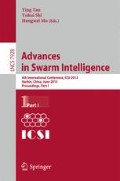Abstract
In this paper, we utilized particle swarm optimization algorithm to solve a regression analysis problem in dielectric relaxation field. The regression function is a nonlinear, constrained, and difficult problem which is solved by traditionally mathematical regression method. The regression process is formulated as a continuous, constrained, single objective problem, and each dimension is dependent in solution space. The object of optimization is to obtain the minimum sum of absolute difference values between observed data points and calculated data points by the regression function. Experimental results show that particle swarm optimization can obtain good performance on regression analysis problems.
Access this chapter
Tax calculation will be finalised at checkout
Purchases are for personal use only
Preview
Unable to display preview. Download preview PDF.
References
Bratton, D., Kennedy, J.: Defining a standard for particle swarm optimization. In: Proceedings of the 2007 IEEE Swarm Intelligence Symposium (SIS 2007), pp. 120–127 (April 2007)
Cheng, S., Shi, Y., Qin, Q.: Experimental study on boundary constraints handling in particle swarm optimization: From population diversity perspective. International Journal of Swarm Intelligence Research (IJSIR) 2(3), 43–69 (2011)
Cheng, S., Shi, Y., Qin, Q.: Promoting diversity in particle swarm optimization to solve multimodal problems. In: Lu, B.-L., Zhang, L., Kwok, J. (eds.) ICONIP 2011, Part II. LNCS, vol. 7063, pp. 228–237. Springer, Heidelberg (2011)
Cheng, S., Shi, Y., Qin, Q.: Population diversity based study on search information propagation in particle swarm optimization. In: Proceedings of 2012 IEEE Congress on Evolutionary Computation (CEC 2012), pp. 1272–1279. IEEE, Brisbane (2012)
Cheng, S., Shi, Y., Qin, Q.: Population diversity of particle swarm optimizer solving single and multi-objective problems. International Journal of Swarm Intelligence Research (IJSIR) 3(4), 23–60 (2012)
Cheng, S., Shi, Y., Qin, Q., Ting, T.O.: Population diversity based inertia weight adaptation in particle swarm optimization. In: Proceedings of The Fifth International Conference on Advanced Computational Intelligence (ICACI 2012), pp. 395–403. IEEE, Nanjing (2012)
Clerc, M., Kennedy, J.: The particle swarm–explosion, stability, and convergence in a multidimensional complex space. IEEE Transactions on Evolutionary Computation 6(1), 58–73 (2002)
Debye, P.J.W.: Polar Molecules. Chemical Catalogue Company, New York (1929)
Eberhart, R., Kennedy, J.: A new optimizer using particle swarm theory. In: Proceedings of the Sixth International Symposium on Micro Machine and Human Science, pp. 39–43 (1995)
Eberhart, R., Shi, Y.: Particle swarm optimization: Developments, applications and resources. In: Proceedings of the 2001 Congress on Evolutionary Computation (CEC 2001), pp. 81–86 (2001)
Eberhart, R., Shi, Y.: Computational Intelligence: Concepts to Implementations, 1st edn. Morgan Kaufmann Publisher (2007)
Hastie, T., Tibshirani, R., Friedman, J.: The Elements of Statistical Learning: Data Mining, Inference, and Prediction, 2nd edn. Springer Series in Statistics. Springer (February 2009)
Kennedy, J., Eberhart, R.: Particle swarm optimization. In: Proceedings of IEEE International Conference on Neural Networks, pp. 1942–1948 (1995)
Kennedy, J., Eberhart, R., Shi, Y.: Swarm Intelligence. Morgan Kaufmann Publisher (2001)
Mendes, R., Kennedy, J., Neves, J.: The fully informed particle swarm: Simpler, maybe better. IEEE Transactions on Evolutionary Computation 8(3), 204–210 (2004)
Shi, Y., Eberhart, R.: A modified particle swarm optimizer. In: Proceedings of the 1998 Congress on Evolutionary Computation (CEC 1998), pp. 69–73 (1998)
Zhao, C., Zhao, C.Z., Tao, J., Werner, M., Taylor, S., Chalker, P.R.: Dielectric relaxation of lanthanide-based ternary oxides: physical and mathematical models. Journal of Nanomaterials 2012, 1–6 (2012)
Author information
Authors and Affiliations
Editor information
Editors and Affiliations
Rights and permissions
Copyright information
© 2013 Springer-Verlag Berlin Heidelberg
About this paper
Cite this paper
Cheng, S., Zhao, C., Wu, J., Shi, Y. (2013). Particle Swarm Optimization in Regression Analysis: A Case Study. In: Tan, Y., Shi, Y., Mo, H. (eds) Advances in Swarm Intelligence. ICSI 2013. Lecture Notes in Computer Science, vol 7928. Springer, Berlin, Heidelberg. https://doi.org/10.1007/978-3-642-38703-6_6
Download citation
DOI: https://doi.org/10.1007/978-3-642-38703-6_6
Publisher Name: Springer, Berlin, Heidelberg
Print ISBN: 978-3-642-38702-9
Online ISBN: 978-3-642-38703-6
eBook Packages: Computer ScienceComputer Science (R0)

